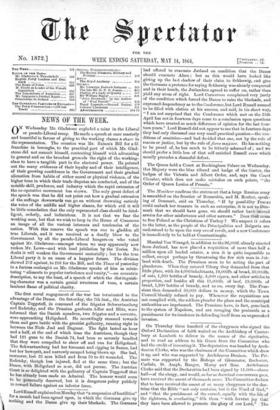NEWS OF THE WEEK.
ON Wednesday Mr. Gladstone exploded a mine in the Liberal or pseudo-Liberal camp. He made a speech at once masterly and beautiful in favour of giving to the working classes a share in the representation. The occasion was Mr. Baines's Bill for a 6/. franchise in boroughs, to the practical part of which Mr. Glad- stone did not commit himself, contenting himself with advocating in general and on the broadest grounds the right of the working- class to have a tangible part in the electoral power. He pointed out the many evidences of their loyalty and of their intelligence, of their growing confidence in the Government and their gradual alienation from habits of either moral or physical violence, of the higher tone in which their trade disputes are conducted, and of the notable skill, prudence, and industry which the rapid extension of the co-operative movement has shown. The only great defect of the speech was that he did not point out how a gradual extension of the suffrage downwards can go on without drowning entirely the voice of the middle and higher dames, for which evil it will be little consolation that the only represented class should be intel- ligent, orderly, and industrious. It is not that we fear the working men, but that we wish to keep in the House of Commons an image of all the variout interests and tendencies of the nation. With this reserve the speech was one to gladden all true Liberals, and it was received as a deadly blow to the Government by all the pseudo-Liberal hangers-on who voted against Mr. Gladstone—amongst whom we may apparently now reckon Mr. Lowe—and with loud jubilation by the Tories. No doubt it will weaken the Government materially ; but to the true Liberal party it is an omen of a happier future. The division showed 272 against, to 216 for the Bill, and the Times of yesterday in a furious onslaught on Mr. Gladstone speaks of him as minis- tering "ailments to popular turbulence and vanity,"—an eccentric description, to say the least, of a speech of which the distinguish- ing character was a certain genial sweetness of tone, a certain lambent flame of political charity.






























